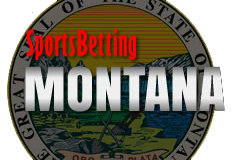Montana Lawmakers Taking a “Wait-and-See” Approach To Legal Sports Betting
 Despite being one of the few states that has been able to have sports betting these past few decades during the reign of PASPA, Montana does not seem in any rush to start legalizing the activity fully. When the Supreme Court made its decision in May to overturn the Professional and Amateur Sports Protection Act, it was presumed by gamblers everywhere that states would be rushing to get their piece of the pie and open sportsbooks as quickly as possible. So a state with partially legal sports betting would be perfectly poised to take full advantage of this and jump right into the deep end, right?
Despite being one of the few states that has been able to have sports betting these past few decades during the reign of PASPA, Montana does not seem in any rush to start legalizing the activity fully. When the Supreme Court made its decision in May to overturn the Professional and Amateur Sports Protection Act, it was presumed by gamblers everywhere that states would be rushing to get their piece of the pie and open sportsbooks as quickly as possible. So a state with partially legal sports betting would be perfectly poised to take full advantage of this and jump right into the deep end, right?
This is not the case for Montana, as it faces a set of unique problems that many other states like New Jersey or Delaware do not.
Montana is the fourth largest state by area in the United States. It is known as Big Sky country, and for good reason. There are vast amounts of open land in Montana. This technically isn’t a problem – California is even bigger, and they have gambling venues all up and down the coast. The problem with how large Montana isn’t its size necessarily. Rather, the issue stems from the inverse size of its population when compared to the size of the physical state. There are just over one million people living in Montana, and because of this, not enough people per square foot to justify opening a large gambling venue, even for something as potentially lucrative as sports betting.
Now I know what you might be thinking – okay, so Montana doesn’t have a casino and can’t sustain a casino. Big deal, they can just open sportsbooks at their racetracks and offer it at their bars like they used to do with the football pools. Problem solved, right?
Unfortunately no. Montana’s bars and racetracks are perfectly capable of handling pools right now, where the bettors play against each other rather than against the house. But if sports betting were to be offered at these venues, it opens business owners up to having to handle payouts from the house, not the pot.
With the small size of some of these venues, a single hit on an underdog could potentially bankrupt a business, if the payout were big enough. Now, most responsible business owners wouldn’t offer lines on something they couldn’t back, but that would mean keeping payouts very low no matter what, essentially taking the fun out of sports betting for Montana residents by keeping limits low.
Finally, with everything being so spread out in Montana, sports betting at low limits just might not be a big enough draw to get people to potentially drive several hours from their home and into a venue where they’re required to spend money. As any person with common sense can tell you, if there’s no one at your place of business, there’s no money coming in, leading to businesses wasting away.
As you can see, a rural state like Montana faces a very different set of issues than a state like Texas or Florida. That being said, legal sports betting in Montana isn’t out of the question. Many legal experts have stated that they wouldn’t be at all surprised to see legislation introduced at the next session in 2019, including Mark Blasdel, a member of the Gaming Advisory Board.
“It’s about being able to set up the entire system. With it being a smaller market, it’s going to take a little bit to put together,” Blasdel says. As with any career politician, his take on the issue was on what would be good for the state. “If it does take place, the state’s going to want their share of the revenue, probably similar to what they got off the gaming machines.”
Montana currently earns a good amount of revenue from Video gambling tax collections. At the end of the 2018 fiscal quarter, the state had raked in just about 15 million, and around the same amount in both the first and second quarter. Should the fourth quarter prove to be consistent, you’re talking about approximately $60 million being added to the budget every year from Video gambling alone. Sports betting, even on a small scale, could easily add to this. More money coming in means that the state would have more money to spend on programs that desperately need additional funds. Legislators are sure to take this into account when weighing the pros and cons of legal sports betting in Montana.
This is evident in the open way that many state politicians have taken when approached about the topic. Rather than a “definitely not!” attitude, Montana legislators are taking a step back from the issue and waiting to see how other states tackle the issue. Says John Iverson, a government affairs consultant with the Montana Tavern Association, “We’re going to learn from what other states have done, but we’re going to have to custom tailor it to the unique state that we live in.”
Montana sports betting does look like it might have a bright future if someone can figure out how to make it work (and make it profitable) in the rural wonderland.
Back to SportsbettingMontana.com
| Best Montana Sports Betting Sites - 100% Trusted + Safe |



